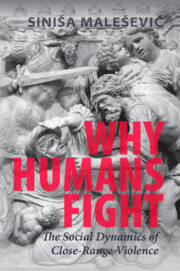Book contents
- Why Humans Fight
- Why Humans Fight
- Copyright page
- Dedication
- Contents
- Acknowledgements
- Introduction
- 1 The Body and the Mind
- 2 Profiting from Fighting
- 3 Clashing Beliefs
- 4 Enforced Fighting
- 5 Fighting for Others
- 6 Avoiding Violence
- 7 Social Pugnacity in the Combat Zone
- 8 Organisational Power and Social Cohesion on the Battlefield
- 9 Emotions and Close-Range Fighting
- 10 Killing in War
- 11 The Future of Close-Range Violence
- Conclusion
- Appendix Methodology and Data Collection
- References
- Index
4 - Enforced Fighting
Coercing Humans into Violence
Published online by Cambridge University Press: 29 September 2022
- Why Humans Fight
- Why Humans Fight
- Copyright page
- Dedication
- Contents
- Acknowledgements
- Introduction
- 1 The Body and the Mind
- 2 Profiting from Fighting
- 3 Clashing Beliefs
- 4 Enforced Fighting
- 5 Fighting for Others
- 6 Avoiding Violence
- 7 Social Pugnacity in the Combat Zone
- 8 Organisational Power and Social Cohesion on the Battlefield
- 9 Emotions and Close-Range Fighting
- 10 Killing in War
- 11 The Future of Close-Range Violence
- Conclusion
- Appendix Methodology and Data Collection
- References
- Index
Summary
Coercion has always played an important part in making ordinary individuals into fighters. The ancient texts including Thucydides’s History of the Peloponnesian War and Sun Tzu’s Art of War point to the role of force in compelling ordinary soldiers to fight. For Thucydides, coercion is the cornerstone of soldering: ‘We must remember that one man is much the same as another, and that he is best who is trained in the severest school’ and ‘The strength of an army lies in strict discipline and undeviating obedience to its officers’ (Thucydides 2019 [400 bce]: Book 2, 80, 92). Sun Tzu is even more precise on the role of force in making soldiers fight: ‘If soldiers are punished before they have grown attached to you, they will not prove submissive; and, unless submissive, they will be practically useless. If, when the soldiers have become attached to you, punishments are not enforced, they will still be useless’ (Sun Tzu 2017 [500 bce]: 30). Hence once individuals are fully integrated into the military organisation they still need to be coerced into fighting: ‘Throw your soldiers into positions whence there is no escape, and they will prefer death to flight. If they will face death, there is nothing they may not achieve … If there is no place of refuge, they will stand firm … if there is no help for it, they will fight hard’ (Sun Tzu 2017 [500 bce]: 37).
Keywords
- Type
- Chapter
- Information
- Why Humans FightThe Social Dynamics of Close-Range Violence, pp. 97 - 128Publisher: Cambridge University PressPrint publication year: 2022



